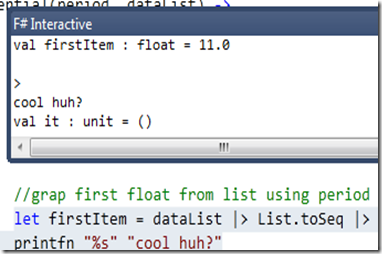To try out F#I decided to make a function to calculate simple moving average (SMA) and exponential moving average (EMA). The SMA and EMA have enough math to try many of the features of F# and functional programming.
The first thing I learned was F# has a way to quickly execute code. If you haven’t played with F#’s Interactive it’s sort of like a REPL loop. While coding you can highlight the code and do a Alt-Enter to execute it. It’s very convenient.
To keep with the functional style of programming I put the SMA and EMA into a type. In OO this would be the equivalent of using a base class for moving averages and then creating classes for SMA and EMA. As you can see in F# this is a very small amount of code using type declaration / discriminators. You can see comments in my code below for things I learned and picked up while doing this exercise.
type movingAverage =
| Simple of int * seq<float>
| Exponential of int * float list
// sma is an example of using a private / utility function
// pipelining operator |> allows execution of a series of operations
let sma(size, seq) =
Seq.windowed size seq
|> Seq.map Array.average
// example of Matching on discriminated unions
let calculate(movingAverage) =
match movingAverage with
|Simple(size, seq) -> sma(size, seq)
|Exponential(period, data) ->
let multiplier = 2.0 / (1.0 + (float period))
//Calc a sum to use in the SMA to prime the EMA calculation
//http://bit.ly/bG73sx Slice like functionality from a List
let iniSum =
data
|> List.toSeq
|> Seq.take (int period)
|> Seq.sum
//first float from list using period as the start
let firstItem =
data
|> List.toSeq
|> Seq.skip (int period)
|> Seq.head
//setup first ema with sma
let firstEma = (iniSum / (float period))
let out : float array = Array.zeroCreate (List.length data)
//setup initial Ema to previous day
out.[period - 2] <- firstEma
//calculate the rest of the Ema's
for i in period - 1 .. (List.length data - 1) do
let close = data.[i]
let prev = out.[i - 1]
out.[i] <- multiplier * (close - prev) + prev
Array.toSeq out
// F# Note - intrinsic type extensions adds the calculate member to the movingAverage type
type movingAverage with
member x.calculate() = calculate(x)
//Test Simple
let simpleMovingAverage = Simple(10, (Seq.map float [|1..30|]))
let avgs = simpleMovingAverage.calculate();
for avg in avgs do
printfn "%f" avg
//Test Exponential
let expMovingAverage = Exponential(10, [1.0..30.0])
let expAvgs = expMovingAverage.calculate();
for e in expAvgs do
printfn "%f" e
a big thanks to this F# technical indicator series.

Leave a Reply